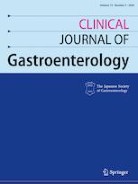業績報告 【accept】星恒輝 先生 Clin J Gastroenterol誌
星恒輝先生の論文が、Clin J Gastroenterol誌にacceptされました。
Clin J Gastroenterol. 2021 Jun 7. doi: 10.1007/s12328-021-01457-9. Online ahead of print.
Association of long-term endoscopic biliary stent placement with choledocholithiasis: a literature review
Koki Hoshi, Atsushi Irisawa, Keiichi Tominaga, Kenichi Goda, Makoto Iijima
Affiliations expand
PMID: 34100256 DOI: 10.1007/s12328-021-01457-9
Abstract
Endoscopic stone removal is currently the first-line procedure for the treatment of common bile duct stones. Advances in equipment and treatment techniques have expanded the scope of application of endoscopic treatment to include stones that have previously been difficult to remove endoscopically, such as stacked stones and large stones. For the treatment of common bile duct stones in elderly patients in particular, long-term placement of a biliary stent is increasingly being selected. Although periodic stent replacement is required, some reports have stated that biliary stenting is useful in terms of treatment-associated invasiveness and the incidence of accidental complications. To date, various opinions have been presented on whether the treatment of bile duct stones should aim for complete removal of stones or adopt the biliary stenting approach. Findings in previous reports suggest that both the approach for complete stone removal and the long-term stenting approach are associated with advantages and disadvantages. In this study, we reviewed previous reports on the significance of placing a stent and implementing careful monitoring rather than stone removal in patients with bile duct stones.
Keywords: Biliary stent; Choledocholothiasis; Difficult stone; Elderly patients; Stone removal.
https://pubmed.ncbi.nlm.nih.gov/34100256/

